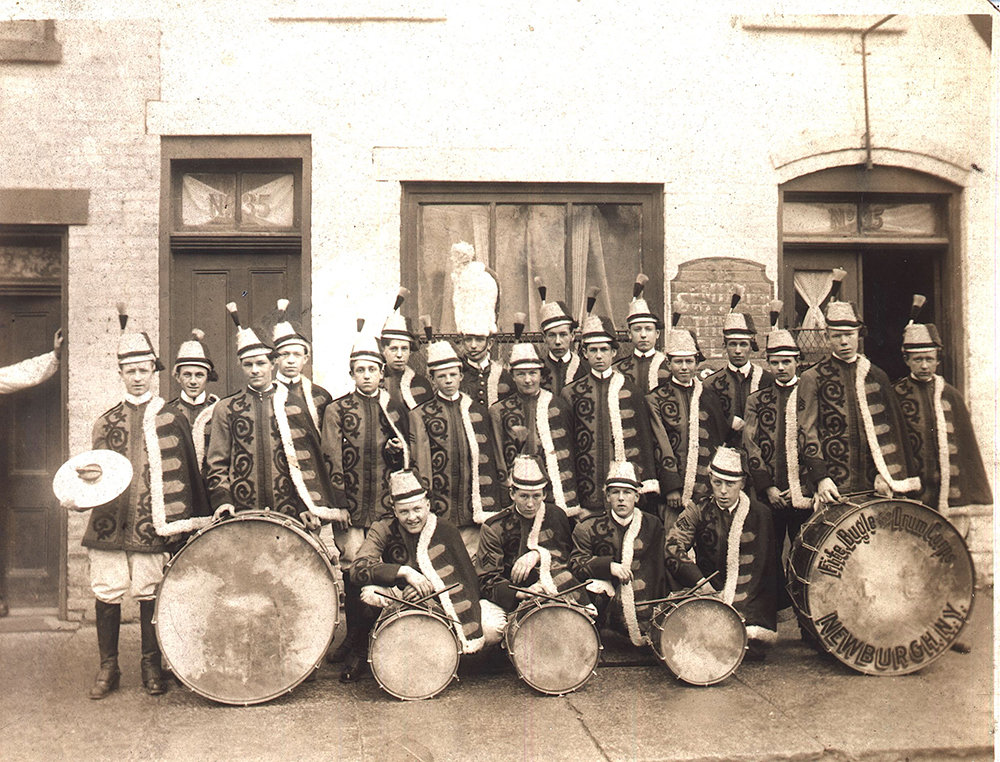
Teen members of the Mannerchor’s fife and drum corps line up in parade uniforms.
By Mary McTamaney
In many countries the New Year, even more than Christmas, is welcomed with song. Groups stroll through the streets caroling or bands march and perform for their neighbors. Music fills the air and beckons folks to come out and join in, to come out and witness the first day of a new year and new hope. I have had the delight of witnessing this tradition in several places, especially in Germany where I once lived.
The tradition crossed the Atlantic as Germans immigrated to America. In the 1860’s and 1870’s in particular, Newburgh saw the arrival of hundreds of Germans who, like my great-grandparents, struggled against language barriers and poverty to make their way in a new land. One of the traditions from “the old country” that connected and comforted them was their music.
In the first week of January, 1862, the Newburgh Mannerchor was organized. Mannerchor translates to Men’s Choir and it was a singing society in which members could keep the emotional connection to their homeland with both the lyrics and fellowship a chorus engenders. The group of German-American men met in the home of Professor H. A. Brinig, a talented choir director who owned a music store where Carpenter Street meets Water Street in old downtown. Herman Koenig was elected their first club president. The original roster is filled with family names that once supported much of the growth of Newburgh after the Civil War.
The first choir consisted of Philip Diemer, Peter Schwenk, William Thomas, Henry Commeyer, Henry Bellis, Jacob Faulhaber, Charles Cost, Philip Kober, A. Moss, Peter Schutt, George Diesseroth, Charles Meyer, Charles Kickelhan, Frederick Diet, William Mucke, Leopold Muettenhoff, George Kraft, Henry Mueller, George Lindner, Charles Neuman, Charles Hoffman, John Mattern and William Biermeister.
Newburgh Mannerchor were champion singers and had a clubhouse full of trophies to prove it. They competed all around the state in Sangerfests, a German tradition of choral competions and won first prize many times against choirs from Poughkeepsie, Port Jervis and Albany. On special anniversaries of the club, they held joyful concerts for Newburgh and the surrounding communities. In 1887, for their silver anniversary, they filled the nearly 1,000 seats of the old Newburgh Opera House on Second Street (site of today’s public library). For their golden anniversary in 1912, local crowds packed all the seats of Columbus Hall on Liberty Street (today’s site of old St. Patrick’s School) to hear them sing. In 1910, they purchased a building at 30 Chambers Street for their headquarters where they held their meetings, practices, and social dinners for members and families. In the late 1930’s they had intended to expand that old brick row house onto an adjacent lot they purchased to build a “real hall for all the social purposes of the community.” Like so many plans, it is likely that World War II changed that course of events.
The Newburgh Mannerchor continued as a club even after the days of singing competitions ended. Youngsters were welcomed for years by the aging members of the society to use their big practice room for the popular mid-twentieth century organization of marching bands. Chambers Street continued to echo with the sounds of drum corps getting their rhythms right for the next public parade.
As 2022 dawns, we can wonder if any descendants of those original German immigrants who founded the Newburgh Mannerchor in 1862 gathered anywhere with friends to sing in the new year.